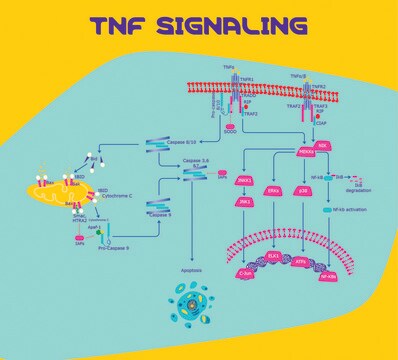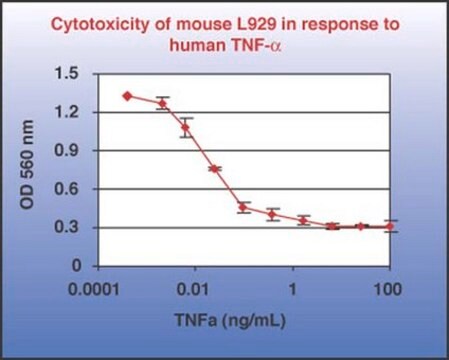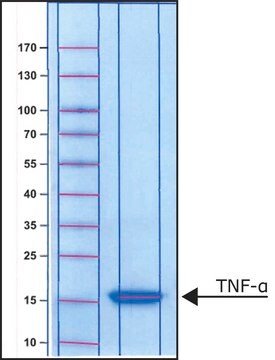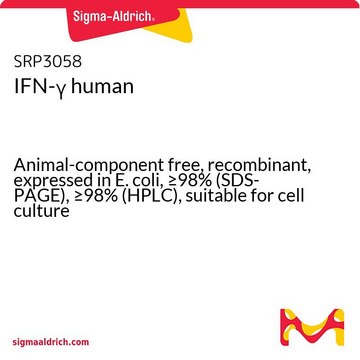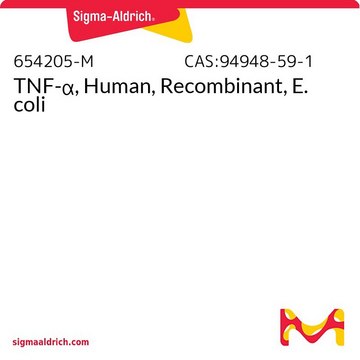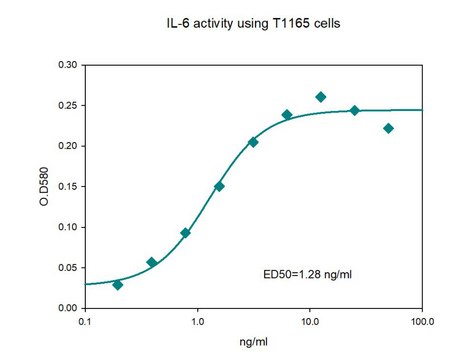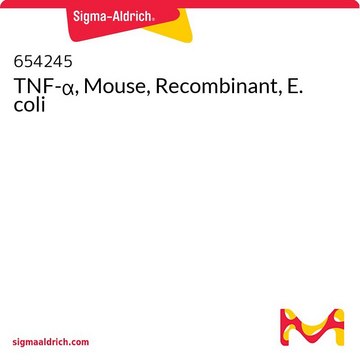推薦產品
相關類別
一般說明
TNF-α(肿瘤坏死因子α)是由多种细胞分泌的多效性促炎细胞因子,包括脂肪细胞,活化的单核细胞,巨噬细胞,B细胞,T细胞和成纤维细胞。它属于TNF配体家族,通过TNFR1和TNFR2两个受体进行信号传导。该基因定位于人类染色体6p21.3。重组人TNF-α是一种可溶性157个氨基酸的蛋白质(17.4 kDa),对应于全长跨膜蛋白的C末端胞外域。
應用
人TNF-α(肿瘤坏死因子α)已被用作诱导人肠和肝细胞系中促炎基因的阳性对照。
生化/生理作用
TNF-α(肿瘤坏死因子α)对多种肿瘤细胞具有细胞毒性,是介导免疫反应对抗细菌感染的重要因子。然而,它既可以是肿瘤促进剂,也可以是肿瘤抑制剂。TNF-α在感染性休克、自身免疫性疾病、类风湿性关节炎、炎症、细胞凋亡和糖尿病的诱导中也起作用。它还与情绪和焦虑症有关。
序列
VRSSSRTPSD KPVAHVVANP QAEGQLQWLN RRANALLANG VELRDNQLVV PSEGLYLIYS QVLFKGQGCP STHVLLTHTI SRIAVSYQTK VNLLSAIKSP CQRETPEGAE AKPWYEPIYL GGVFQLEKGD RLSAEINRPD YLDFAESGQV YFGIIAL
外觀
从10mM磷酸钠,pH 7.4 + 0.5 mM DTT中冻干。
重構
打开样品瓶之前需离心。 在水中重悬至浓度为 0.1-1.0mg/ml。 不可涡旋。 该溶液可在2-8°C下储存长达1周。 对于长期储存,建议用含有稳定剂(例如5%海藻糖)的缓冲液进一步稀释,并按使用量分装储存于-20℃至-80℃。
儲存和穩定性
Store the product at −20 °C. After reconstitution, theproduct can be stored at 2-8 °C for up to 1 month.For extended storage, freeze in working aliquots.Repeated freezing and thawing are not recommended.Do not store in a frost-free freezer.
儲存類別代碼
13 - Non Combustible Solids
水污染物質分類(WGK)
WGK 3
閃點(°F)
Not applicable
閃點(°C)
Not applicable
分析證明 (COA)
輸入產品批次/批號來搜索 分析證明 (COA)。在產品’s標籤上找到批次和批號,寫有 ‘Lot’或‘Batch’.。
客戶也查看了
Immunogenicity of Anti-TNF-alpha agents in autoimmune diseases.
Emi Aikawa N
Clinical Reviews in Allergy & Immunology, 38, 82-89 (2010)
Breast cancer cells induce stromal fibroblasts to express MMP-9 via secretion of TNF-alpha and TGF-beta.
Stuelten CH
Journal of Cell Science, 118, 2143-2153 (2005)
Effects of carrageenan on cell permeability, cytotoxicity, and cytokine gene expression in human intestinal and hepatic cell lines.
McKim JM Jr
Food And Chemical Toxicology, 96, 1-10 (2016)
Regulation of cytokines, cytokine inhibitors, and acute-phase proteins following anti-TNF-alpha therapy in rheumatoid arthritis.
Charles P
Journal of Immunology, 163, 1521-1528 (1999)
Association between tumor necrosis factor-a gene polymorphisms and diffuse large B-cell lymphoma in Chinese Han population: evidence from two center case-control study and a meta-analysis.
Yang C
International Journal of Clinical and Experimental Pathology, 8, 13011-13022 (2015)
我們的科學家團隊在所有研究領域都有豐富的經驗,包括生命科學、材料科學、化學合成、色譜、分析等.
聯絡技術服務